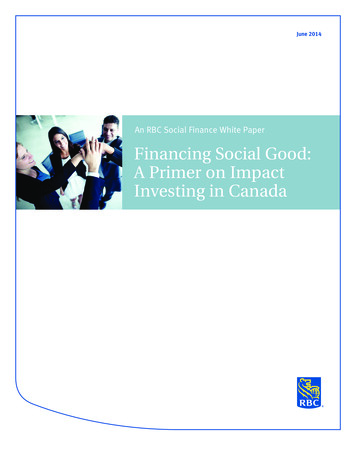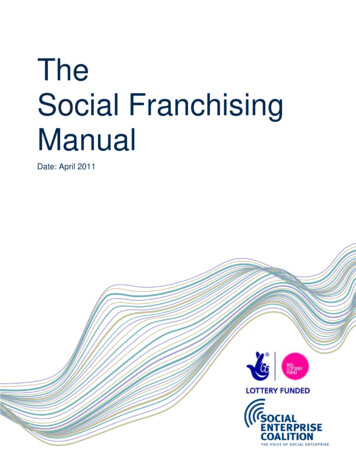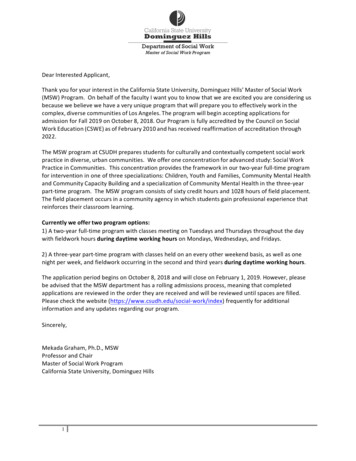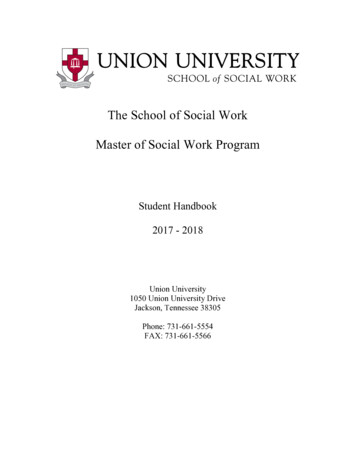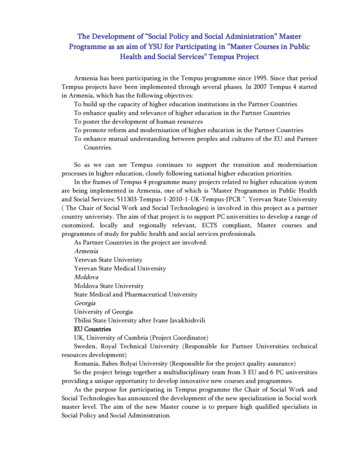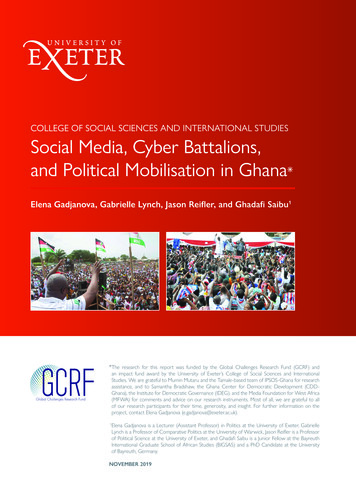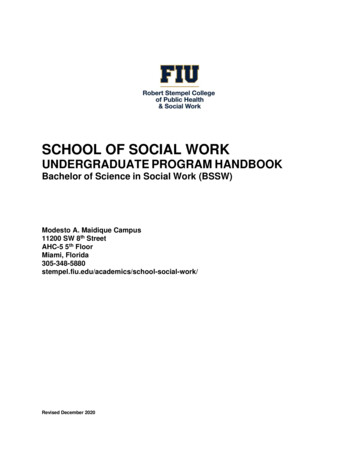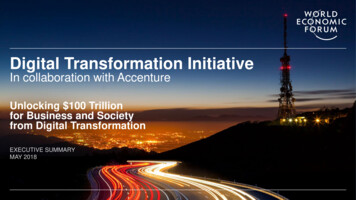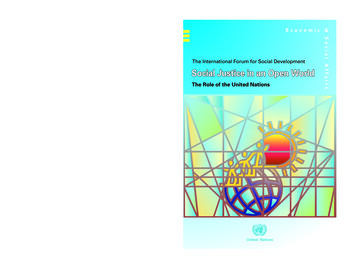
Transcription
Economic &Social Justice in an Open WorldThe Role of the United NationsSales No. E.06.IV.2ISBN 92-1-130249-505-62917—January 2006—2,000United NationsSocial AffairsThe International Forum for Social Development
ST/ESA/305DEPARTMENT OF ECONOMIC AND SOCIAL AFFAIRSDivision for Social Policy and DevelopmentThe International Forum for Social DevelopmentSocial Justice in an Open WorldThe Role of the United NationsasdfUnited NationsNew York, 2006
DESAThe Department of Economic and Social Affairs of the United Nations Secretariat isa vital interface between global policies in the economic, social and environmentalspheres and national action. The Department works in three main interlinked areas:(i) it compiles, generates and analyses a wide range of economic, social and environmental data and information on which States Members of the United Nations drawto review common problems and to take stock of policy options; (ii) it facilitates thenegotiations of Member States in many intergovernmental bodies on joint courseof action to address ongoing or emerging global challenges; and (iii) it advises interested Governments on the ways and means of translating policy frameworks developed in United Nations conferences and summits into programmes at the countrylevel and, through technical assistance, helps build national capacities.NoteThe views expressed in this publication do not necessarily reflect those of theUnited Nations. The designations employed and the presentation of the material do not imply the expression of any opinion whatsoever on the part of theSecretariat of the United Nations concerning the legal status of any country orterritory or of its authorities, or concerning the delimitations of its frontiers.The term “country” as used in the text of the present report also refers, as appropriate, to territories or areas.The designations of country groups in this publication are intended solely forstatistical or analytical convenience and do not necessarily express a judgmentabout the stage reached by a particular country or area in the developmentprocess.Additional information on the Forum can be accessed at: www.un.org/esa/socdev/IFSD/index.htmlSymbols of United Nations documents are composed of capital letters combined with figures.ST/ESA/305United Nations publicationSales No. E. 06.IV.2ISBN 92-1-130249-8Copyright United Nations, 2006All rights reservedPrinted by the United Nations, New York
ContentsPageExplanatory notes . . . . . . . . . . . . . . . . . . . . . . . . . . . . vForeword . . . . . . . . . . . . . . . . . . . . . . . . . . . . . . . . . viiIntroduction . . . . . . . . . . . . . . . . . . . . . . . . . . . . . . . 11 Dimensions of international justice and social justice . . . . . . .111.1 International justice: legal and developmental aspects . . . . . .111.2 Social justice: a recent and politically charged concept . . . . . . 111.3 Social justice: the equivalent of distributive justice . . . . . . . .131.4 Economic justice: a component of social justice . . . . . . . . .141.5 Universal grounds for the determination of what is justand what is unjust . . . . . . . . . . . . . . . . . . . . . . . . . 141.6 Three critical domains of equality and equity . . . . . . . . . . .151.7 Six important areas of inequality in the distribution ofgoods, opportunities and rights . . . . . . . . . . . . . . . . . .171.8 The need for further distinction and greater precision . . . . . . . 202 Rising inequalities among countries . . . . . . . . . . . . . . . . . 212.1 National sovereignty and the right of intervention . . . . . . . . . 212.2 Equality among Member States and inequalities in power . . . .212.3 The developmental aspect of international justice:a legitimate concern? . . . . . . . . . . . . . . . . . . . . . . .232.4 Evidence of the decline in international justice froma developmental perspective . . . . . . . . . . . . . . . . . . .263 Rising inequalities among people . . . . . . . . . . . . . . . . . .283.1 Issues relating to the reliability and diversity of sourcesof information . . . . . . . . . . . . . . . . . . . . . . . . . . .283.2 Trends in six major areas of inequality among people . . . . . . . 293.3 Progress in critical aspects of “horizontal” equality . . . . . . . . 393.4 Economic justice and social injustice: the current stateof affairs . . . . . . . . . . . . . . . . . . . . . . . . . . . . . . 404 International justice and the United Nations:from the new international economic order to theMillennium Declaration and Millennium Development Goals . . . 414.1 Auspicious beginnings for development andinternational cooperation . . . . . . . . . . . . . . . . . . . . . . 41iii
4.2 Questioning the development model and seeking anew distribution of power in the world . . . . . . . . . . . . . .424.3 A new consensus: the Millennium Declaration andMillennium Development Goals . . . . . . . . . . . . . . . . . . 444.4 International justice through cooperation and partnership . . . . . 474.5 Critical views on the prevalent conception ofinternational justice . . . . . . . . . . . . . . . . . . . . . . . .485 Social justice and the United Nations: the divide betweenhuman rights and economic and social development . . . . 515.1 Auspicious beginnings for the promotion of human rightsand justice . . . . . . . . . . . . . . . . . . . . . . . . . . . . . 515.2 Social justice seen as a substitute for the protection ofhuman rights . . . . . . . . . . . . . . . . . . . . . . . . . . . . 525.3 The World Summit for Social Development: an attemptto reconcile social justice and the protection of human rights . . . 555.4 The short life of the commitments made in Copenhagen . . . . . 595.5 The focus on poverty eradication . . . . . . . . . . . . . . . . .606 Are international justice and social justice politicallyobsolete concepts? . . . . . . . . . . . . . . . . . . . . . . . 726.1 Less redistribution because of lack of resources? . . . . . . . . . 726.2 The effect of different policies on patterns of distribution . . . . . 736.3 A great political and ideological transformation withstrong implications for the idea of distributional justice . . . . . . 776.4 The dangers of a world indifferent to justice . . . . . . . . . . .807 Concluding notes on the role of the United Nations . . . . . . . . 84Annexes . . . . . . . . . . . . . . . . . . . . . . . . . . . . . . . . . . 93I. Commitments of the Copenhagen Declaration onSocial Development . . . . . . . . . . . . . . . . . . . . . . . . . . 93II. The Millennium Development Goals, targets, and indicatorsfor monitoring progress . . . . . . . . . . . . . . . . . . . . . . . . 114III. Themes and questions figuring in the agendas of the fourmeetings of the International Forum for Social Development . . . . . 118IV. List of participants in the four meetings of the Forum . . . . . . . .iv145
Explanatory notesThe following abbreviations have been used:AIDSacquired immunodeficiency syndromeCFCchlorofluorocarbonDACDevelopment Assistance CommitteeDOTSdirectly observed treatment short courseEUEuropean UnionFAO Food and Agriculture Organization of the United NationsGATSGeneral Agreement on Trade in ServicesGDPgross domestic productGNIgross national incomeGNPgross national productHIPCheavily indebted poor countriesHIV human immunodeficiency virusICTinformation and communication technologiesILOInternational Labour OrganizationIMFInternational Monetary FundLDCleast developed countryNGOnon-governmental organizationODAofficial development assistanceOECD Organization for Economic Cooperation and DevelopmentUNCTAD United Nations Conference on Trade and DevelopmentUNDPUnited Nations Development ProgrammeUNESCO United Nations Educational, Scientific and Cultural OrganizationUNFPAUnited Nations Population FundUNHCR Office of the United Nations High Commissioner for RefugeesUNICEFUnited Nations Children’s FundUNIDOUnited Nations Industrial Development OrganizationUNRWA United Nations Relief and Works Agency for Palestine Refugees in the Near EastWIDER World Institute for Development Economics ResearchWTOWorld Trade Organization
Social Justice in an Open World: The Role of the United NationsForewordThe International Forum for Social Development was a three-year project undertaken by the United Nations Department of Economic and Social Affairs betweenNovember 2001 and November 2004 for the purpose of promoting internationalcooperation for social development and supporting developing countries and socialgroups not benefiting from the globalization process. “Open Societies, Open Economies: Challenges and Opportunities” represented the overall theme of the project,which was financed through extrabudgetary contributions and carried out within theframework of the implementation of the outcome of the World Summit for SocialDevelopment, held in Copenhagen in 1995, and of subsequent major internationalgatherings, including the Millennium Summit and the twenty-fourth special sessionof the General Assembly, held in New York and Geneva, respectively, in 2000.Four meetings of the Forum were held at United Nations Headquarters in NewYork, as follows: Financing Global Social Development, 7-8 February 2002 Cooperation for Social Development: The International Dimension,16-17 October 2002 International Migrants and Development, 7-8 October 2003 Equity, Inequalities and Interdependence, 5-6 October 2004These meetings brought together invitees from different regions and differentwalks of life for seminars followed by open and informal debate with representatives from United Nations Member States and non-governmental organizations.Findings were presented orally at the annual sessions of the Commission for SocialDevelopment, and reports or summaries were issued.The present publication seeks to provide an overview and interpretation of thediscussions and debates that occurred at these four meetings from the broad perspective of distributive justice. During the year this work was under preparation,the United Nations reviewed the commitments made ten years ago in Copenhagento promote social development and in Beijing to pursue equality between men andwomen. In the light of the evolution of the Organization’s mandates and priorities,however, considerably greater attention was given to the review of the United Nations Millennium Declaration and to the assessment of the progress made towardsthe achievement of the Millennium Development Goals. The 2005 World Summit,which produced the largest gathering of world leaders in history, was held by theGeneral Assembly in New York from 14 to 16 September and focused on development, security and human rights, as well as on United Nations reforms proposedvii
Social Justice in an Open World: The Role of the United Nationsby the Secretary-General.1 It is hoped that the analyses and observations presentedhere will contribute to the continuing debate on these important issues.Jacques BaudotCoordinator, International Forum for Social Developmentviii
Social Justice in an Open World: The Role of the United NationsIntroductionThe rise in inequality in the distribution of income among people is well-documentedand displays the characteristics of a trend, having affected large numbers of countries, from the poorest to the most affluent, during the past two decades. Up to the1980s, at least since the Second World War and in some cases since the beginningof the twentieth century, there had been a general narrowing of differences in theincome available to individuals and families.Income-related inequalities, notably in the ownership of capital and other assets, in access to a variety of services and benefits, and in the personal securitythat money can buy, are growing. There is also greater inequality in the distributionof opportunities for remunerated employment, with worsening unemployment andunderemployment in various parts of the world affecting a disproportionate numberof people at the lower end of the socio-economic scale. The inequality gap betweenthe richest and poorest countries, measured in terms of national per capita income,is growing as well.The popular contention that the rich get richer and the poor get poorer appearsto be largely based on fact, particularly within the present global context. Moreover,extreme or absolute poverty, experienced by those whose income is barely sufficient for survival, remains widespread. Indigence levels have risen in the most affluent countries, in countries once part of the Soviet bloc and in various parts of Africa,but have remained stable in Latin America and have declined in Asia. Extreme poverty and the suffering it entails affect a large proportion of humankind, and majorefforts by Governments and international organizations to reduce or eradicate poverty have thus far failed to produce the desired results.Do these facts and trends suggest a regression in social justice? The answer tothis question, if considered within the framework of the Charter of the United Nations and the Universal Declaration of Human Rights,2 is not unequivocal. The persistence, aggravation and very existence of extreme poverty constitute an injustice.Those experiencing dire poverty are deprived of a number of the fundamental rightsinvoked in the Charter and enumerated in the Universal Declaration. Individuals affected by internal conflicts and wars are also robbed of many of their basic freedoms and are thus victims of injustice as well. Hunger is but one face of poverty;discrimination, poor health, vulnerability, insecurity, and a lack of personal and professional development opportunities are among the many other challenges facedby the poor. The rise in poverty in all its manifestations, along with the increase inthe numbers of refugees, displaced persons and other victims of circumstance and
Social Justice in an Open World: The Role of the United Nationsabuse, represents sufficient evidence for a judgment of persistent, if not growing,injustice in the world.Unlike justice in the broad sense, social justice is a relatively recent concept,born of the struggles surrounding the industrial revolution and the advent of socialist(and later, in some parts of the world, social democratic and Christian democratic)views on the organization of society. It is a concept rooted very tenuously in the Anglo-Saxon political culture. It does not appear in the Charter, or in the Universal Declaration or the two International Covenants on Human Rights. Frequently referredto in the Copenhagen Declaration and Programme of Action adopted by the WorldSummit for Social Development in 1995, social justice was scarcely mentioned fiveyears later in the United Nations Millennium Declaration.3Some proponents of social justice—though significantly fewer since the collapse of State communism—dream of total income equality. Most, however, holdthe view that when people engage in economic activity for survival, personal andprofessional growth, and the collective welfare of society, inequality is inevitablebut should remain within acceptable limits that may vary according to the particular circumstances. In the modern context, those concerned with social justice seethe general increase in income inequality as unjust, deplorable and alarming. It isargued that poverty reduction and overall improvements in the standard of living areattainable goals that would bring the world closer to social justice. However, thereis little indication of any real ongoing commitment to address existing inequalities.In today’s world, the enormous gap in the distribution of wealth, income and publicbenefits is growing ever wider, reflecting a general trend that is morally unfair, politically unwise and economically unsound. Injustices at the international level haveproduced a parallel increase in inequality between affluent and poor countries.These are political judgments deriving from the application of political concepts.Inequalities in income and in living conditions within and between countries are notdefined as just or unjust in international texts or national constitutions. Some economists argue that a more equal distribution of income facilitates economic growth,given the involvement of more people with energy and diverse skills in the economyand the increased demand for goods and services, while others retort that savings andcapital accumulation are strengthened by the concentration of income at the top of thesocio-economic scale. Similarly, the call for greater equality in the distribution of worldincome at the international level is weakened by the observation that technologicaland other innovations vital to the health of the world economy originate in the most affluent countries. Sociologists may contend that excessive income inequality restrictssocial mobility and leads to social segmentation and eventually social breakdown, butother social scientists counter this argument with examples of economically successful authoritarian or elitist societies. Arguments founded on moral fairness are easilydisposed of in an atmosphere of moral relativism and cultural pluralism. Present-day
Social Justice in an Open World: The Role of the United Nationsbelievers in an absolute truth identified with virtue and justice are neither willing nordesirable companions for the defenders of social justice.Aware of the difficulties inherent in the defence of their support for greaterequality in the distribution of income, the proponents of social justice are cognizantof the fact that trends relating to the fundamental question of equality of rightsare not as clear as those associated with income and income-related inequalities.Extreme poverty persists and is even deepening in some parts of the world, whichrepresents a violation of basic human rights according to current international standards. In many respects, however, equality of rights has improved dramatically. During the past several decades, people have achieved freedom from authoritarian andtotalitarian regimes on a massive scale. Furthermore, despite various setbacks andsome alarming signs of regression, the trend towards the treatment of all humanbeings as members of the same global family, set in motion after the Second WorldWar, has continued virtually uninterrupted owing to concerted efforts to reduce andultimately eliminate all forms of discrimination. Particularly noteworthy is the steadyprogress made in achieving equality between women and men in spite of numerous cultural and religious obstacles. Greater equality of rights is also apparent forspecific groups such as indigenous peoples and disabled persons. The equality gapremains somewhat wider for migrant workers and refugees, though there is anincreasing global awareness of their predicament.The issue of equality of opportunities further complicates efforts to determinewhether ground has been lost or gained in the realm of social justice. Apart fromthe issue of unemployment, an area in which social justice appears to have suffered setbacks in recent years, there is the crucial question of whether societiesoffer their people sufficient opportunities to engage in productive activities of theirchoice wherever they wish, whether at home or abroad, and to receive benefits andpersonal and
The International Forum for Social Development Social Justice in an Open World The Role of the United Nations E c o n o m i c & S o c i a l A f f a i r s

